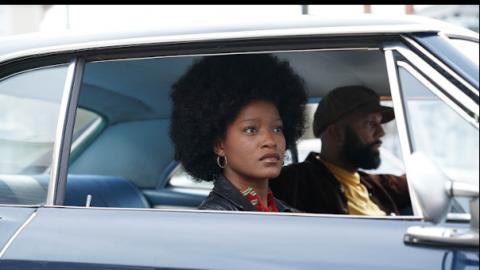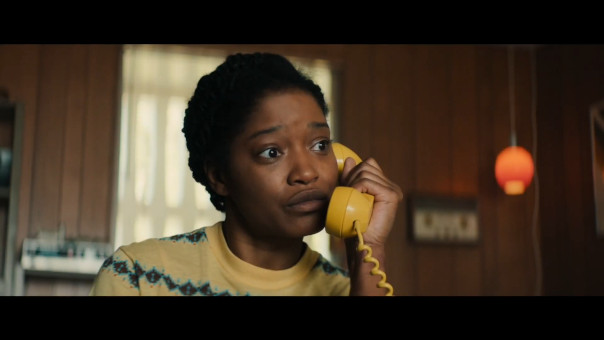‘Alice’ Promises Themes of Revenge and Justice, but Fails to Deliver

Somewhere in Alice, there lies a good movie that serves as both an homage to blaxploitation cinema of the 1970s and a satisfying revenge story. Yet, Alice fails to deliver on either front, instead meandering through its runtime and cumulating in an uninspired finale. Rather than challenge audiences, we are left with a movie that is rather uninspired than thought-provoking.
Director and writer Krystin Ver Linden is a former student of Quentin Tarantino, having assisted in the production of his films Inglorious Basterds and Django Unchained. In her directorial debut, Linden focuses her story on Alice, a slave who escapes her plantation only to discover the year is 1973. With the help of Frank, a truck driver (Common), she hatches up a plan to kill her former slave master. Like Inglorious Basterds and Django Unchained, Alice too crafts a revenge fantasy where a survivor exacts revenge on their cruel oppressor.
Like her mentor Tarantino, Linden pays tribute to blaxploitation films of the 1970s. In the film, Alice watches Pam Grier’s Coffy, which serves as an inspiration for her revenge and her appearance. Yet, despite Linden’s clear admiration for these filmmakers, what Alice fails to do is craft a compelling story, thus the film’s protagonist’s journey feels unearned.
Keke Palmer is a talented actress who makes the most of her screen time. Unfortunately, the script is not up to par with Palmer’s dynamic and elegant performance. The character of Alice is severely underutilized. Half of the film’s runtime is devoted to life on the plantation, thus Alice’s escape and subsequent discovery that she is in the year 1973 never gets a moment to breathe. Despite Alice finding herself in a new century, the news never seems to shock Alice.

There are moments where she is interacting with new technology, or reading about the civil rights movement, but she never experiences moments of adjustment. Alice seemingly has no problem conducting research at a library or seeing cars driving, or understanding what radio and film are. She never has a moment where she grapples with the craziness and trauma of culture shock. She learns the truth, and then it is on to the next story beat. Her character seemingly takes it all at face value, despite reappearing into a brand-new world overnight. The modern-day aspects end up feeling like a marketing gimmick, rather than essential to the overall story.
As an artist and a public figure, I respect Common immensely, but he leaves much to be desired as an actor. His performance is lifeless. Every line he delivers is monotone. In fairness, he is given a thankless task. As a character, Frank’s role is simply reduced to the film’s historian who catches up Alice on the past hundred years. Opposite Palmer, Common appears bored. His demeanor never shifts throughout the movie. Common gives off an aura of timidness and quietness, yet as the audience, we are supposed to believe that Alice would form a trust and companionship with his character.
Despite the film’s ambitions, every story beat is predictable. Linden’s screenplay juggles a multitude of ideas but fails to give proper attention to any one idea. The story lacks focus. At times, Alice wants to serve as a historical look into the horrors of slavery, a humorous fish-out-of-water story, a revenge film, a metaphor for our current political climate, and an homage to Pam Grier’s filmography. It accomplishes none of this and instead becomes a hodgepodge of half-baked story ideas.

Despite the topic of slavery, the film is passive in its condemnation of racism. The screenplay makes the deliberate choice to avoid the word “slave” and instead utilizes the term “domestics” as a stand-in. Decisions like this only serve to soften the cruelty and evil of slavery. It is akin to calling the Civil War an issue of “states’ rights.” Yet, despite playing coy with the term “slavery,” the film does not shy away from showing slaves’ suffering. The first half of the film depicts Alice being beaten, spit on, hogtied, and raped by her slave master (Jonny Lee Miller). Yet, when it is Alice’s turn to exact revenge, the camera is timid to showcase her retribution, thus the cathartic nature of this revenge film is unsatisfactory.
Despite its intriguing premise, Alice plays it safe. The film’s narrative leads to the moment of revenge, yet is too afraid to deliver on said aspect. It pays homage to the characters of Pam Grier, but is unwilling to execute the violence that helps define characters such as Coffy and Foxy Brown. Instead, Alice is timid in its approach, and for all the wrong reasons.
Author Bio:
Ben Friedman is a freelance film journalist and a contributing writer at Highbrow Magazine. For more of his reviews, visit bentothemovies.com, his podcast Ben and Bran See a Movie, or follow him on Instagram, Twitter, and YouTube: The Beniverse.
For Highbrow Magazine































































































































































































































































































































